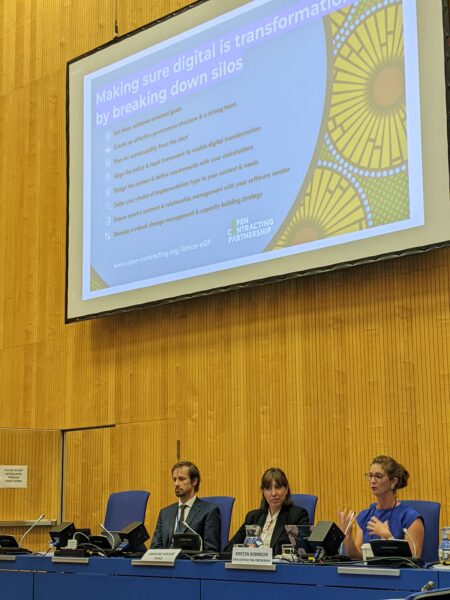How can we strengthen integrity in public procurement? An event on the margins of the 14th session of the Implementation Review Group (IRG) in June 2023 co-organized by Transparency International France, Open Contracting Partnership and the UNCAC Coalition and sponsored by France discussed this question. The moderator Caroline Goussé, Special Assistant on Anti-Corruption and Legal Advisor to the Economic Diplomacy Directorate of France opened the event by underscoring the importance of public procurement integrity as an ultimate priority. The government of France has announced that it will be tabling a resolution on public procurement transparency at the 10th Conference of the States Parties.

Kristen Robinson, Head of Advocacy, Open Contracting Partnership (OCP), highlighted the role of public procurement transparency in the fight against corruption. Procurement is the number one corruption risk of governments. Achieving the Sustainable Development Goals is directly linked to promoting procurement that is effective, efficient and free from corruption. The digitization that happened over the last 20 years bears a lot of potential for achieving this goal. Key components of effective digital procurement are: Improving data quality and accessibility, covering the whole cycle of procurement, engaging non-state actors effectively, and making sure digitization is transformational by breaking down silos. The first resolution dedicated solely to procurement which will be tabled by France at the 10th Conference of the States Parties is an opportunity to build on these practices and introduce a stronger focus on implementation.
Pierre Houllemare, Legal consultant at the Procurement Economics, Statistics and Technics Office of the Directorate of Legal Affairs of the French Ministry of Economy and Finance and Sandrine Jarry, Deputy Director, French State Procurement, illustrated how e-procurement tools helped tackle corruption in France by promoting integrity, transparency and accessibility. France has generalized digitization since 2018 with the National Plan for e-Procurement (TNCP) through which e-procurement tools are extended to the entire procurement life cycle. The TNCP that has become a fundamental element in the fight against corruption in France ensuring that the awarding of procurement is made public and accessible for all. In addition to that, the French government has set up two freely accessible tools to enhance transparency in the procurement process: APProch, a digital tool for companies and public buyers that focuses on the planning phase of procurement and the Procurement Notices Module that provides a platform for notices to be created, sent and downloaded.
Kévin Gernier, Advocacy officer, Transparency International (TI) France, reflected on the successes in improving transparency and integrity in public procurement in France in the past decades but also highlighted that there has been regression concerning open procurement. Progress in terms of transparency has been made through the obligation to publish essential data on public procurement since 2018, combined with the new law on open data in the public sector. An effective ownership register was opened two years ago in France. However, automatically detecting conflicts of interest around public procurement still remains a dream. Overall, France has a strong framework but challenges remain in the implementation phase which is only progressing slowly. One worrying tendency witnessed by TI France relates to the mandatory disclosure threshold that was set at 4,000 euros ten years ago and was increased to 40,000 euros today. A crisis framing is often used as an excuse to heighten the threshold temporarily for it eventually to become the new normal which poses a serious challenge to anti-corruption associations.
Sébastien Lepers, Deputy Head of International Relations Department of the French Court of Accounts, and Dominique Dujols, Senior Counsellor and Liaison Officer for the fight against corruption of the French Court of Accounts, presented recent initiatives undertaken by the French Court of Accounts to promote transparency in public procurement. The court has created a fraud detection and prevention guide that helps ensure a rigorous governance approach for the fight against fraud in all public entities and organizations. The jurisdictional function of the French Court of Accounts interacts with the audit one. Serious breaches disclosed by the audit are referred to the litigation chamber for investigation and sanction by the General Prosecutor. Since 2023, the jurisdictional function has been deeply reformed to allow to punish serious misconducts that open the path to fraud or corruption but are not proven criminal offenses. The Court which is a member of the Open Government Partnership has adopted measures to better inform civil society, for instance by publishing all its reports and initiating “flash audits” for the hottest topics. Beyond that, the court has established a citizen’s consultation platform and a reporting platform that is open to citizens, CSOs and whistleblowers to report irregularities in the management of public funds.



